Irrigator allows maintaining the health and beauty of the mouth. Using a toothbrush is not enough for a full-fledged dental hygiene. The device perfectly removes bacteria and plaque in the interdental space, behind the back molars and other hard-to-reach places. Also, the device prevents inflammation of the gums and eliminates an unpleasant odor. Regular use at home can reduce the number of trips to the dentist, extend the life of orthodontic structures and restore healthy microflora in the oral cavity. How to choose the irrigator?

Contents:
- The best irrigation companies
- The principle of operation and the device of irrigators
- Irrigator species
- Irrigator selection parameters
- Which irrigation agent to choose
- How much are the irrigators
The best irrigator manufacturers - which firm to choose
One of the important parameters for choosing the irrigator is the manufacturergoods.
We have prepared the rating of the best companies that have been producing high quality irrigators for many years:
1. Waterpik
2. SoWash
3. JETPIK
4. AQUAJET
These brands are the founders in the production of irrigators. Their products are in demand and competitive in many countries of the world, thanks to a wide range( for professional and home use), high quality cleaning( several modes of operation, power regulators and pressure head) and acceptable cost.
Find out which models of these devices have won the trust of dentists and ordinary users, you can from our rating of the best irrigators.
Principle of operation and device of irrigators
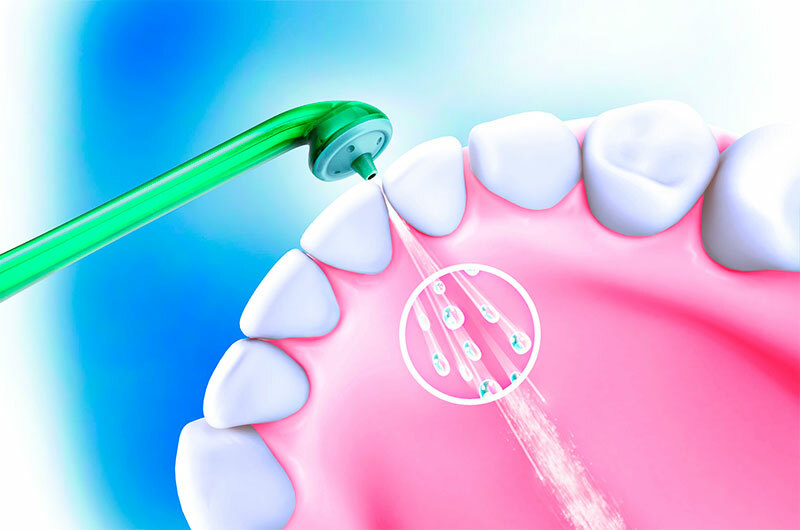
Irrigator is a device for maintaining oral hygiene. The device performs the functions of removing plaque and food debris between the teeth, dental gum massage, tongue and mucous membrane due to the directional head of the liquid.
Depending on the particular model, the jet can be pulsating, continuous or contain microbubbles. As a washing liquid, conventional running water or special solutions with a preventive effect are used. Thanks to special nozzles, the jet reaches the areas in the oral cavity that are unavailable when cleaning with a conventional toothbrush or thread. A head adjustment allows you to use the device for both children and adults.
Irrigator is recommended for use in the presence of crowns, bridges, dental prostheses, braces or other orthodontic structures.
Also indications for use are:
- prophylaxis of gum disease and teeth;
- elimination of unpleasant odor;
- cleaning of inaccessible places for the toothbrush in the oral cavity;
- reduced increased bleeding gums.
Irrigator acts as an additional means of cleansing the oral cavity. The device should not be considered as an alternative to a toothbrush or a thread, becauseits main purpose is soft hygiene of hard-to-reach places, interdental spaces in the oral cavity and gum massage.
Use of this device up to 3 times a week reduces the formation of bacterial plaque, increases the effectiveness of oral hygiene by 50%, improves blood circulation in the tissues of the gums and the general condition of the teeth.
Types of irrigators
Design
Stationary
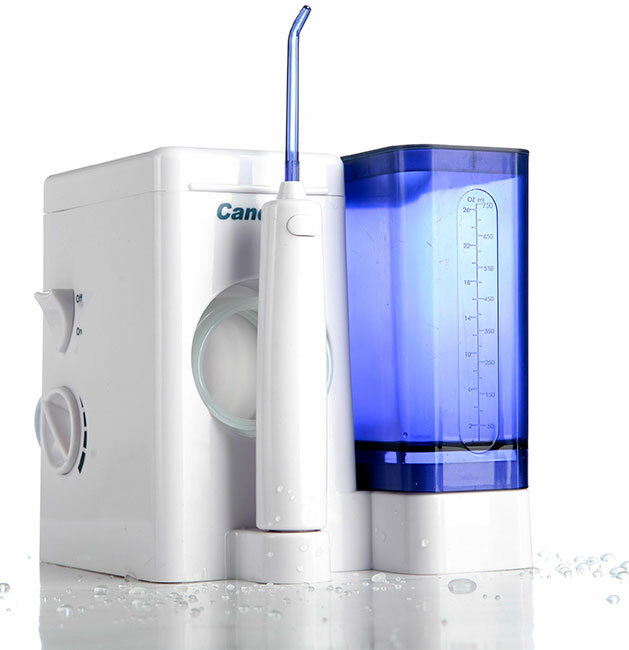
These irrigators are designed for indoor use( often at home).Operate from the mains. The devices are equipped with a compressor, which pumps pressure, which causes the formation of a water stream. Head pressure is adjustable. Irrigators are suitable for use by the whole family.in a set there are various nozzles.
Pluses:
- high power allows you to choose the optimum pressure of the jet;
- wide range of head adjustment;
- large volume of the liquid reservoir;
- in many models there are many built-in attachments;
- intensive care for the gums and teeth.
Disadvantages:
- increased vibration;
- massiveness, noise;
- operation from mains;
- high cost.
Portable
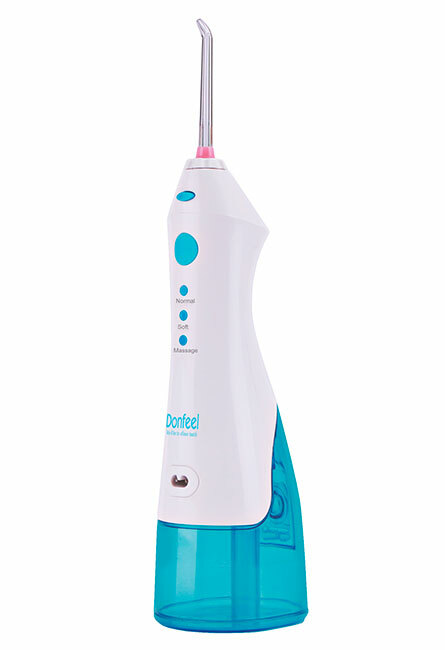
Devices operate from a built-in power source. They consist of a liquid container, a pump and a removable nozzle. Some models have a folding structure, so they fit easily even into a small handbag. Such irrigators are recommended for individual use in travel. Advantages:
- light weight, mobility, ergonomics;
- are great for travel, business trips;
- low noise.
Disadvantages:
- low current sources do not allow to develop the required flow head;
- the need for frequent battery replacement or battery charge;
- easy design is easy to damage;
- a small supply of water or solution may not be enough to fully clean all areas of the oral cavity.
With
cleaning technology
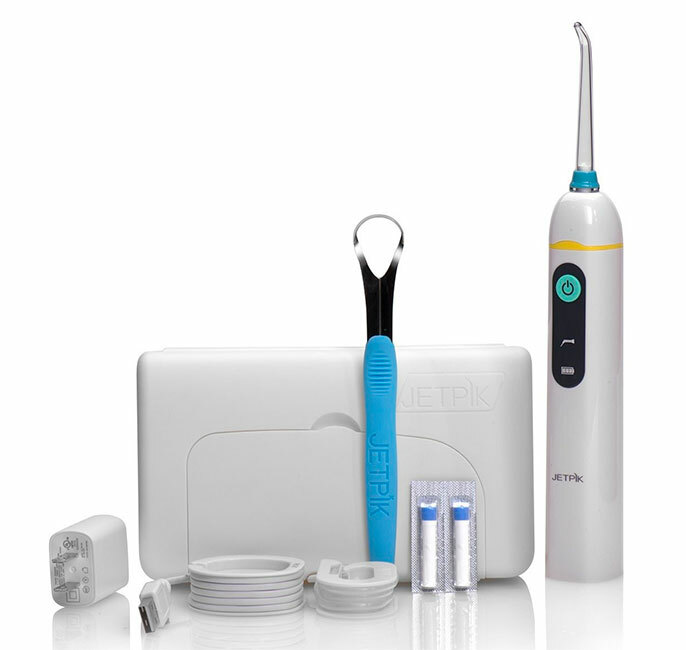
pulsing jet The device creates a thin jet with short pulsations( an average of 1200 micropulses per minute).Due to this, micro-hydraulic shocks are created, which make it possible to effectively eliminate bacterial plaque. Such an irrigator is recommended for persons at risk of periodontal disease, gingivitis. Advantages:
- , short pulsations are almost invisible to the user;
- provides effective massage of periodontal tissues, improves blood circulation;
- cleans the plaque qualitatively in the molar region, in the interdental spaces.
Disadvantages:
- it is necessary to periodically change the nozzles;
- high cost.
Microbubble technology
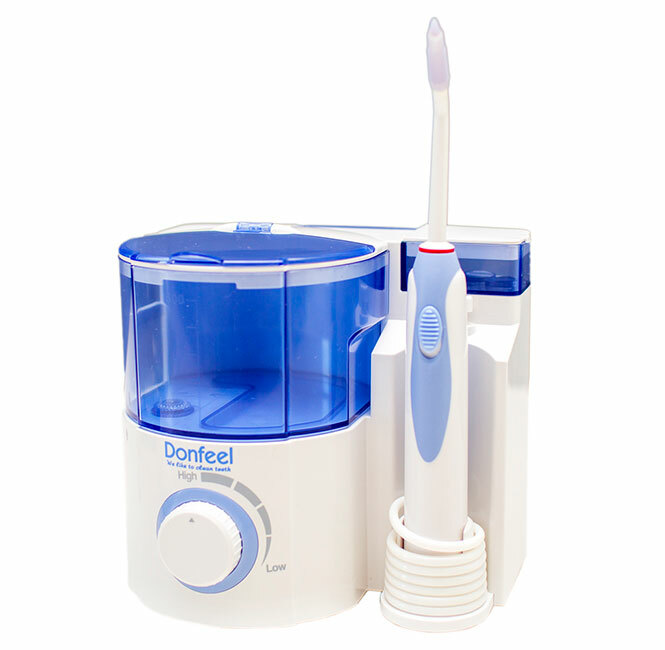
This technology is considered to be the most effective. Irrigator mixes air bubbles with the flow of water, which contributes to the quality removal of plaque and food debris, in addition, the water is saturated with oxygen, which has a bactericidal effect on the pathogenic microflora. Typically, such an irrigator has several modes of operation: the standard and soft head pressure. The devices are also successfully used for washing the nose, oropharynx, with periodontitis, gingivitis, periodontitis and as a prophylaxis of these diseases.
Advantages:
- the correct use of attachments helps to stop the disease, and also strengthen the gum tissue;
- qualitative cleaning of the gingival pockets, interdental spaces;
- bactericidal effect.
Disadvantages:
- high cost;
- after each use, it is recommended to empty the tank of the remaining liquid, otherwise the unit may fail.
The
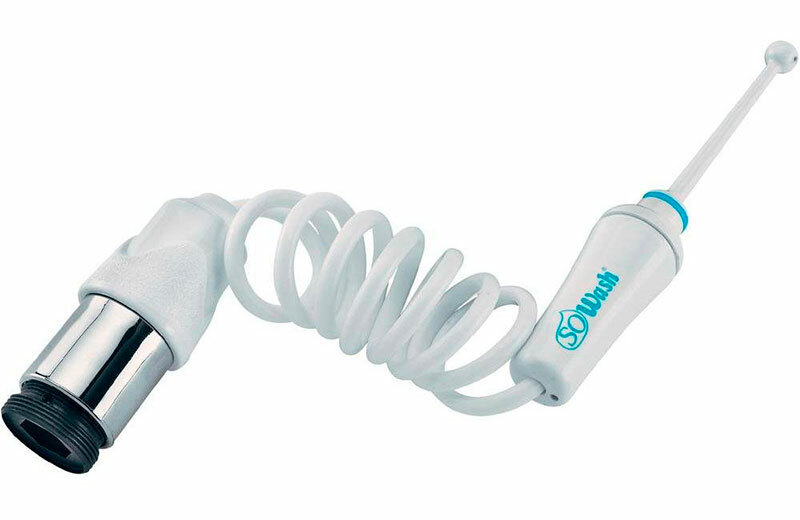
monostructure The device is connected to the water supply and supplies a continuous stream of water. The irrigator is a crane adapter connected by a hose to the handle of the device. Becausesimilar models do not allow to use boiled or filtered water, some devices are equipped with a special capsule with antibacterial fluid. This technology is suitable for the prevention of gum disease and teeth.
Advantages:
- easy to use;
- affordable cost;
- work without power supply;
- device reduces the likelihood of developing diseases of the teeth and gums.
Disadvantages:
- on efficiency, irrigators with monostu are inferior to pulsating and microbubble technology;
- before each use it is necessary to screw the adapter onto the tap, which requires time and effort;
- because of unsatisfactory water quality from the tap, the use of this type of irrigators is contraindicated.
Irrigators selection parameters
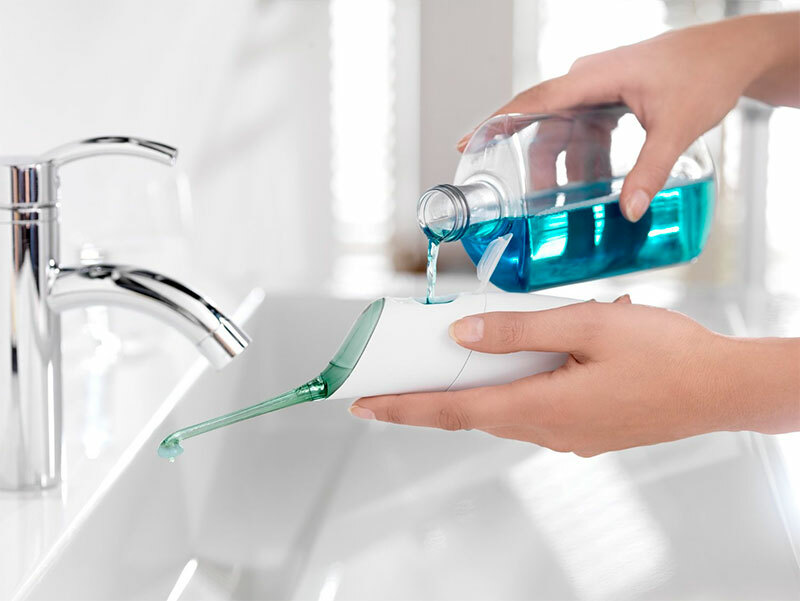
1. Kind of irrigator
Before buying, it is necessary to decide on the type of irrigator. First, you should choose based on the conditions in which the device will be used. Secondly, it is necessary to determine the technology of cleaning, taking into account the advantages and disadvantages of each model.
2. Head
When choosing an irrigator, you should pay attention to the presence of head adjustment. If the device is used by children or people with bleeding gums, then the irrigator should have a gentle pressure regime with little pressure. If the irrigator is necessary for deep intensive cleaning, then it must have a strong head.
3. Modes of operation
Most modern irrigators have different operating modes, the most common are: floss, pulsation, micromassage, turbo flow( spiral and three-jet), spray.
4. Power of
This parameter directly affects the pressure that is created in the tank. In stationary devices, the pressure varies between 600-800 kPa, in portable devices it ranges from 250 to 600 kPa.
5. Package Contents
Basically, 4 to 10 attachments are attached to stationary models, and from 1 to 4 for portable ones. Some manufacturers only include standard nozzles for preventive maintenance.
If a person has braces, a bridge, etc. of a structure or there are some dental diseases, then the irrigator should be selected, equipped with periodontal orthodontic nozzles.
There are also the following attachments:
- for subgingival space;
- for cleaning the tongue;
- for lavage of the nasal sinuses.
6. Ripple frequency
This value can be from 900 to 3000 pulses per minute.
7. Continuous use time
This parameter should be noted if the selection is stopped on the portable form of the irrigator. The usage time depends on the type and capacity of the battery. It is better to choose lithium-ion batteries, the charge of which is enough for a long time.
8. Tank capacity
The capacity of the stationary irrigator can have a volume from 600 to 1000 ml, stationary - 120-250 ml. Select should be based on the number of family members who will use the device.
9. Warranty and after-sales service
Irrigators from different manufacturers can have similar characteristics. In this case, you should pay attention to the availability of warranty and service. Some models are not repairable due to scarce spare parts, so it is very important that the manufacturer provide warranty and post-warranty service in the event of a malfunction of the device.
Which irrigation agent to choose
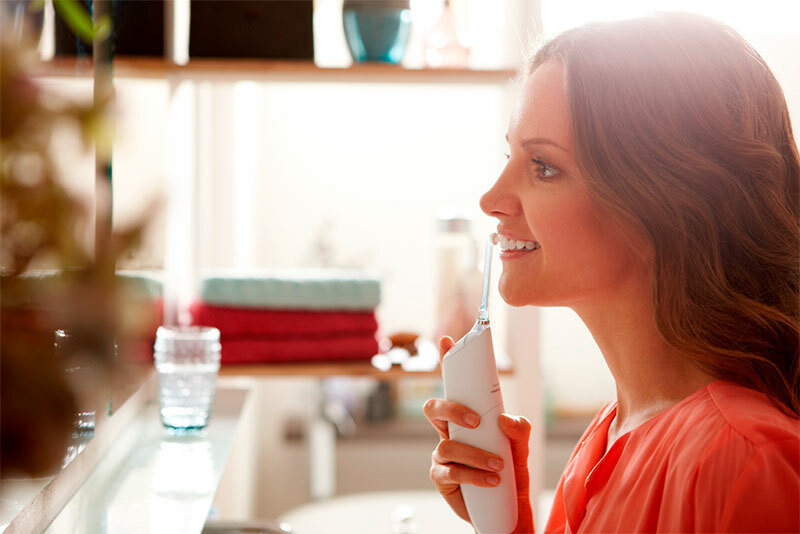
1. If an irrigator is required for use on travel, business trips or travel, then you should select the portable type of irrigator.
2. If the device is necessary for home use, then a stationary irrigator should be selected.
3. If it is purchased for preventive purposes, it is better to choose a budget model with a basic set of attachments. If the irrigator is needed for effective cleaning of the orthodontic structures( braces system, bridge, etc.) or for dental diseases, then you should choose a stationary device with an expanded bundle and various modes of operation.
4. A family consisting of several family members should give preference to models with a large reservoir volume. If an irrigator is used by one person, it is better to choose a small capacity.
5. If the selection is stopped on a portable model, then you should pay attention to the battery capacity. The higher it is, the longer the device will last from a single charge and the user will not have to often charge the irrigator battery.
6. If the appliance is to be used by children or people with bleeding gums, the irrigator must have a head adjustment, with which you can set a gentle mode of operation.
7. 1200 is the optimum number of ripples per minute, so when choosing it, you should be guided by this number.
8. Also it is necessary to choose irrigators with the possibility of warranty service, i.e.the user will be able to seek professional help in the event of a device failure.
How much are the irrigators
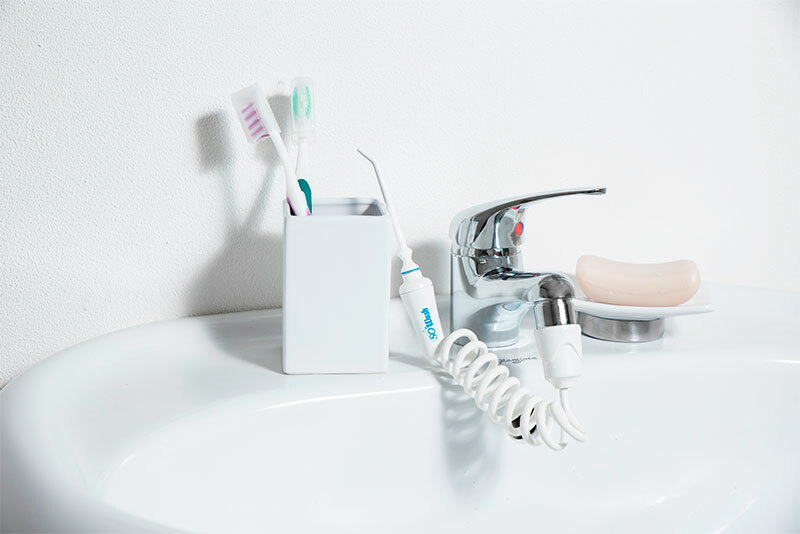
1. The cost of portable irrigators: 2000-5000 p.
2. Cost of stationary irrigators: 2700-16000 р.
3. Cost of irrigators with a monostructure: 2300-4000 r.


